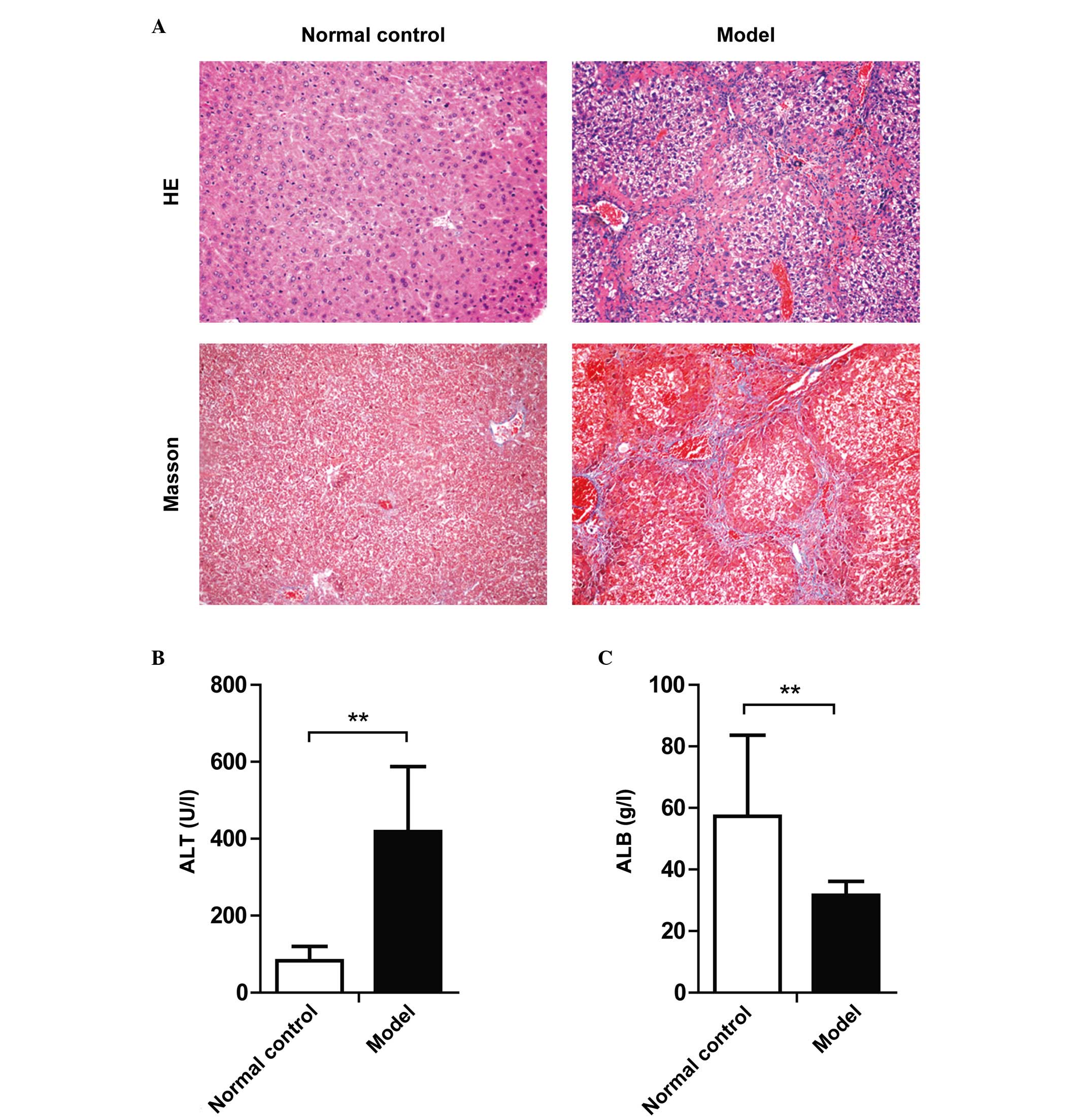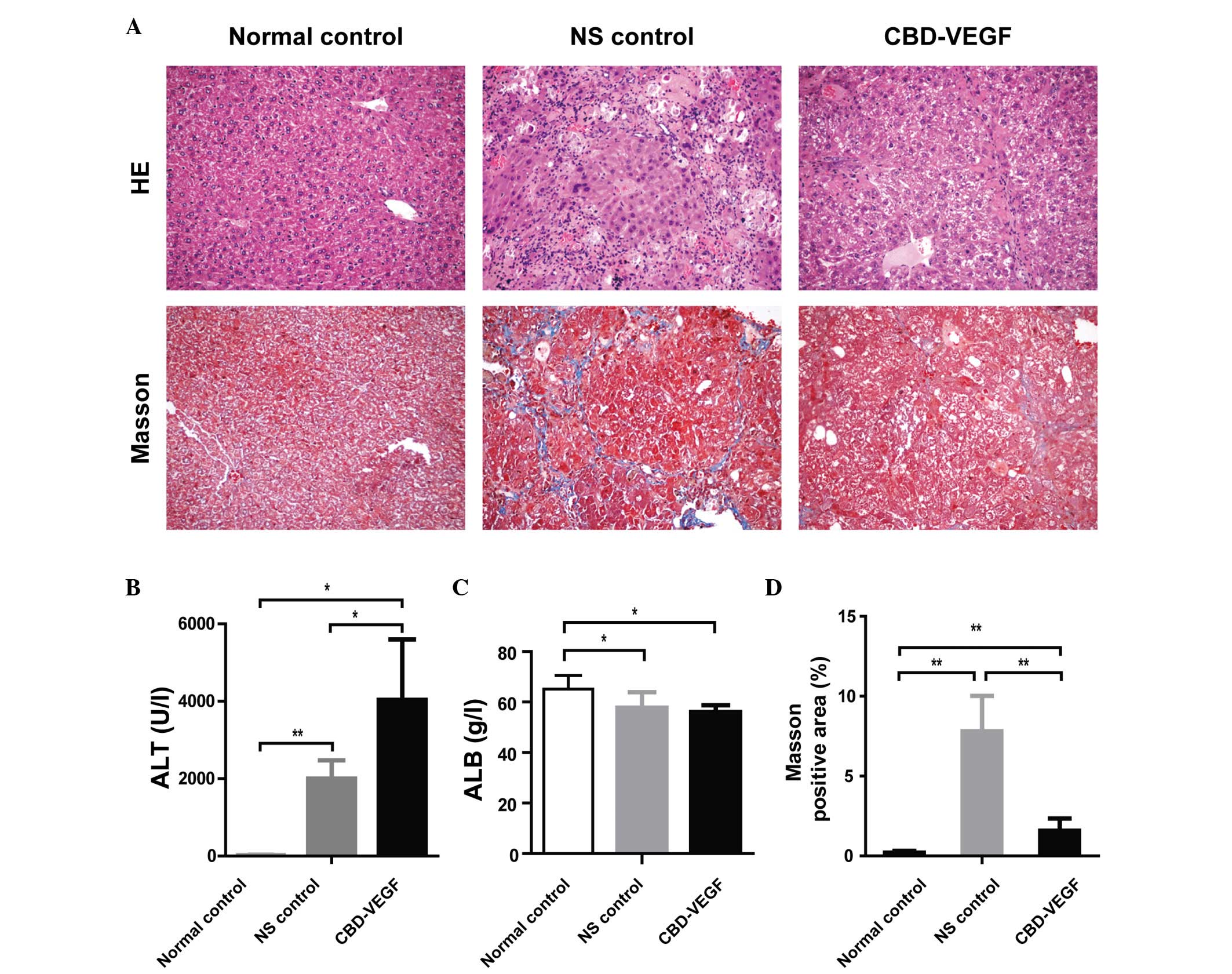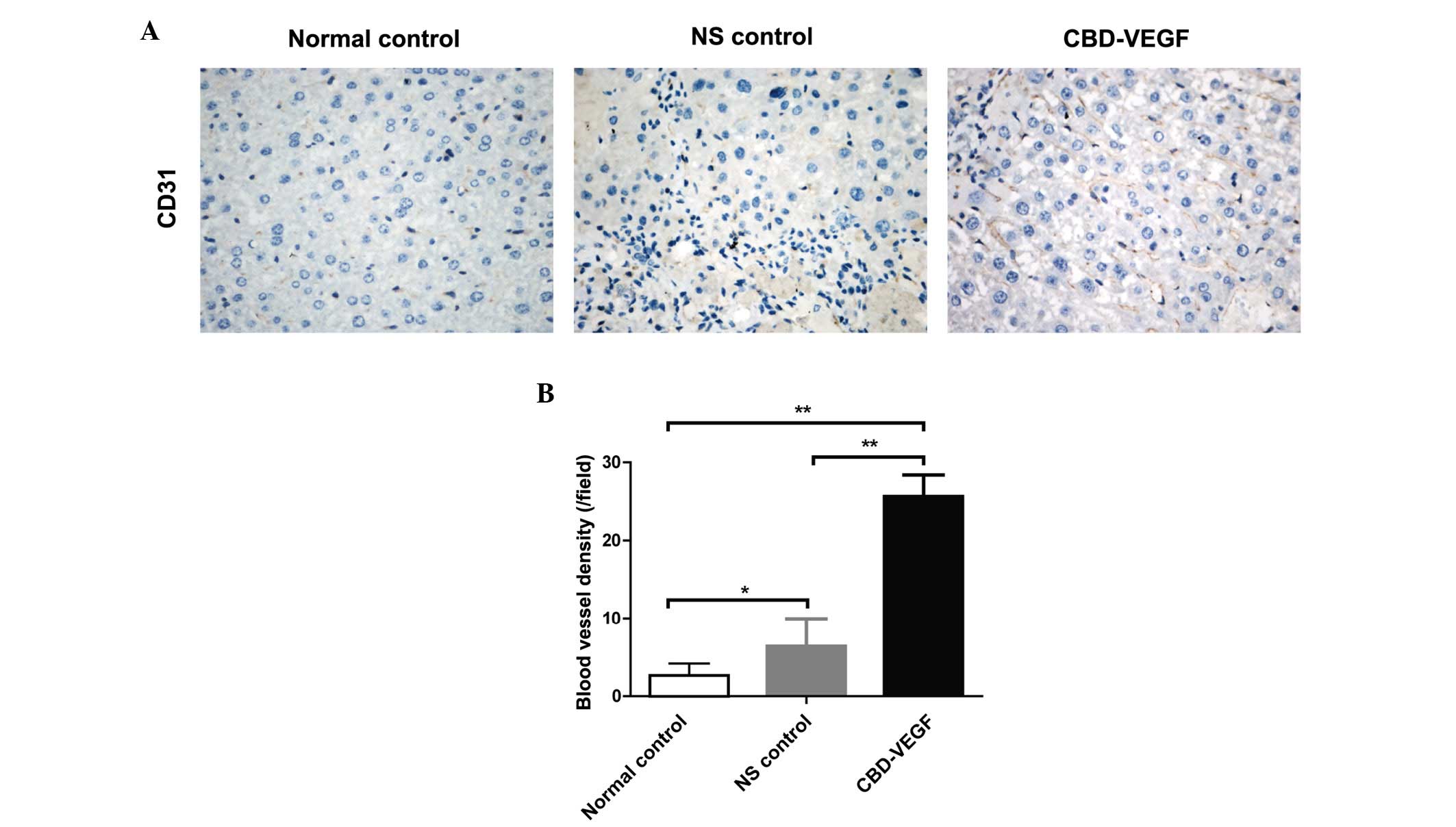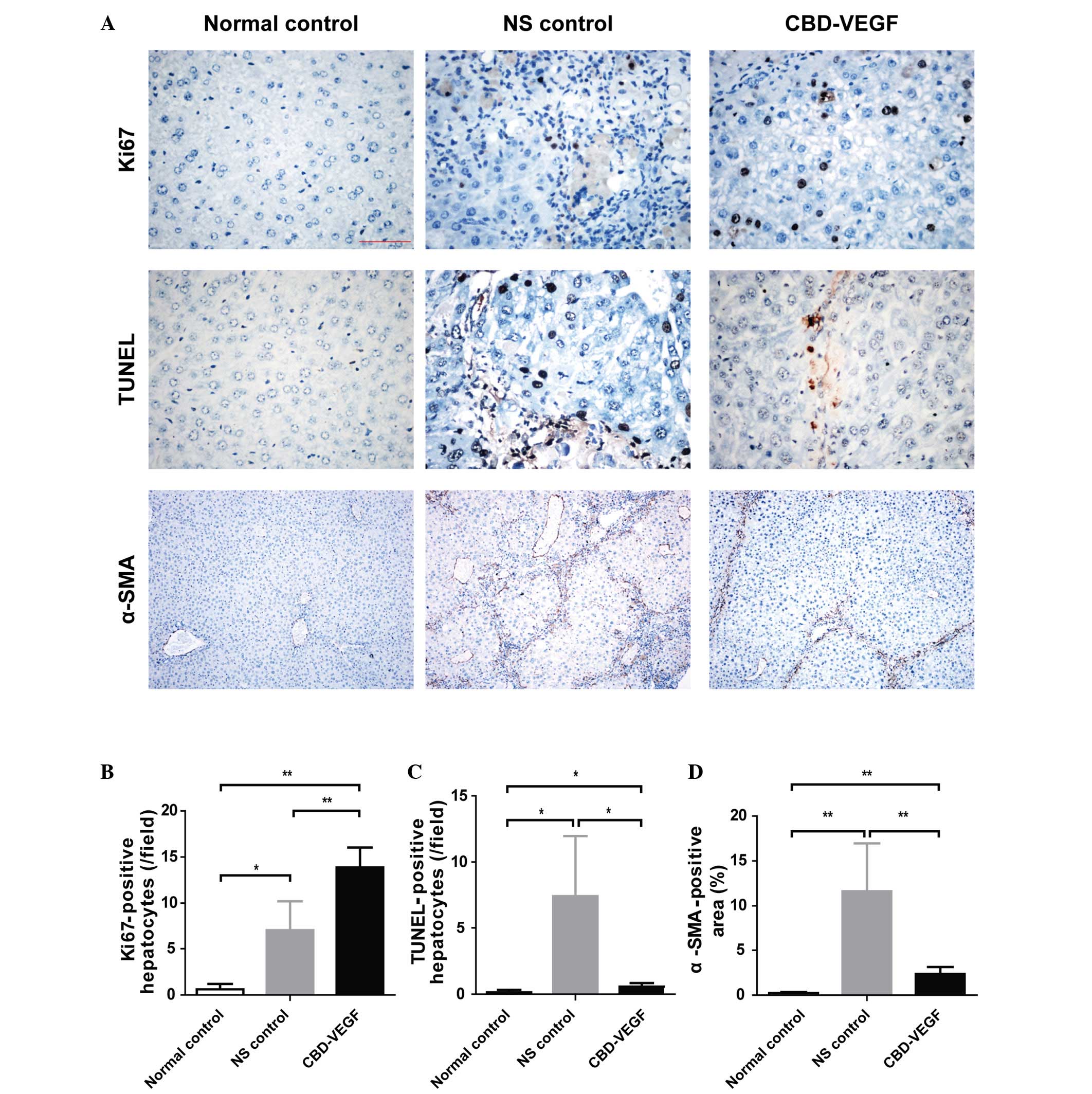|
1
|
Bataller R and Brenner DA: Liver fibrosis.
J Clin Invest. 115:209–218. 2005. View Article : Google Scholar : PubMed/NCBI
|
|
2
|
Tsukada S, Parsons CJ and Rippe RA:
Mechanisms of liver fibrosis. Clin Chim Acta. 364:33–60. 2006.
View Article : Google Scholar : PubMed/NCBI
|
|
3
|
Schuppan D and Afdhal NH: Liver cirrhosis.
Lancet. 371:838–851. 2008. View Article : Google Scholar : PubMed/NCBI
|
|
4
|
Inagaki Y, Nemoto T, Kushida M, Sheng Y,
Higashi K, Ikeda K, Kawada N, Shirasaki F, Takehara K, Sugiyama K,
et al: Interferon alfa down-regulates collagen gene transcription
and suppresses experimental hepatic fibrosis in mice. Hepatology.
38:890–899. 2003. View Article : Google Scholar : PubMed/NCBI
|
|
5
|
Veldt BJ, Heathcote EJ, Wedemeyer H,
Reichen J, Hofmann WP, Zeuzem S, Manns MP, Hansen BE, Schalm SW and
Janssen HL: Sustained virologic response and clinical outcomes in
patients with chronic hepatitis C and advanced fibrosis. Ann Intern
Med. 147:677–684. 2007. View Article : Google Scholar : PubMed/NCBI
|
|
6
|
Bruno S, Stroffolini T, Colombo M, Bollani
S, Benvegnù L, Mazzella G, Ascione A, Santantonio T, Piccinino F,
Andreone P, et al: Sustained virological response to
interferon-alpha is associated with improved outcome in HCV-related
cirrhosis: A retrospective study. Hepatology. 45:579–587. 2007.
View Article : Google Scholar : PubMed/NCBI
|
|
7
|
Schuppan D and Pinzani M: Anti-fibrotic
therapy: Lost in translation? J Hepatol. 56:(Suppl 1). S66–S74.
2012. View Article : Google Scholar : PubMed/NCBI
|
|
8
|
Pinzani M, Rombouts K and Colagrande S:
Fibrosis in chronic liver diseases: Diagnosis and management. J
Hepatol. 42:(Suppl). S22–S36. 2005. View Article : Google Scholar : PubMed/NCBI
|
|
9
|
Alqahtani SA: Update in liver
transplantation. Curr Opin Gastroenterol. 28:230–238. 2012.
View Article : Google Scholar : PubMed/NCBI
|
|
10
|
Lorenzini S and Andreone P: Stem cell
therapy for human liver cirrhosis: A cautious analysis of the
results. Stem Cells. 25:2383–2384. 2007. View Article : Google Scholar : PubMed/NCBI
|
|
11
|
Popov Y and Schuppan D: Targeting liver
fibrosis: Strategies for development and validation of antifibrotic
therapies. Hepatology. 50:1294–1306. 2009. View Article : Google Scholar : PubMed/NCBI
|
|
12
|
Yancopoulos GD, Davis S, Gale NW, Rudge
JS, Wiegand SJ and Holash J: Vascular-specific growth factors and
blood vessel formation. Nature. 407:242–248. 2000. View Article : Google Scholar : PubMed/NCBI
|
|
13
|
Oe H, Kaido T, Mori A, Onodera H and
Imamura M: Hepatocyte growth factor as well as vascular endothelial
growth factor gene induction effectively promotes liver
regeneration after hepatectomy in Solt-Farber rats.
Hepatogastroenterology. 52:1393–1397. 2005.PubMed/NCBI
|
|
14
|
Oe H, Kaido T, Furuyama H, Mori A and
Imamura M: Simultaneous transfer of vascular endothelial growth
factor and hepatocyte growth factor genes effectively promotes
liver regeneration after hepatectomy in cirrhotic rats.
Hepatogastroenterology. 51:1641–1647. 2004.PubMed/NCBI
|
|
15
|
Silva EA and Mooney DJ: Spatiotemporal
control of vascular endothelial growth factor delivery from
injectable hydrogels enhances angiogenesis. J Thromb Haemost.
5:590–598. 2007. View Article : Google Scholar : PubMed/NCBI
|
|
16
|
Zhang J, Ding L, Zhao Y, Sun W, Chen B,
Lin H, Wang X, Zhang L, Xu B and Dai J: Collagen-targeting vascular
endothelial growth factor improves cardiac performance after
myocardial infarction. Circulation. 119:1776–1784. 2009. View Article : Google Scholar : PubMed/NCBI
|
|
17
|
Friedman SL: Molecular regulation of
hepatic fibrosis, an integrated cellular response to tissue injury.
J Biol Chem. 275:2247–2250. 2000. View Article : Google Scholar : PubMed/NCBI
|
|
18
|
National Research Council, . Guide for the
Care and Use of Laboratory Animals. NIH Publications (USA);
Bethesda: pp. 85–23. 1985
|
|
19
|
Zhang D, Jiang M and Miao D: Transplanted
human amniotic membrane-derived mesenchymal stem cells ameliorate
carbon tetrachloride-induced liver cirrhosis in mouse. PLoS One.
6:e167892011. View Article : Google Scholar : PubMed/NCBI
|
|
20
|
Friedman SL: Liver fibrosis-from bench to
bedside. J Hepatol. 38:(Suppl 1). S38–S53. 2003. View Article : Google Scholar : PubMed/NCBI
|
|
21
|
Xu H, Shi BM, Lu XF, Liang F, Jin X, Wu TH
and Xu J: Vascular endothelial growth factor attenuates hepatic
sinusoidal capillarization in thioacetamide-induced cirrhotic rats.
World J Gastroenterol. 14:2349–2357. 2008. View Article : Google Scholar : PubMed/NCBI
|
|
22
|
Kantari-Mimoun C, Castells M, Klose R,
Meinecke AK, Lemberger UJ, Rautou PE, Pinot-Roussel H, Badoual C,
Schrödter K, Österreicher CH, et al: Resolution of liver fibrosis
requires myeloid cell-driven sinusoidal angiogenesis. Hepatology.
61:2042–2055. 2015. View Article : Google Scholar : PubMed/NCBI
|
|
23
|
Ferrara N: Vascular endothelial growth
factor: Basic science and clinical progress. Endocr Rev.
25:581–611. 2004. View Article : Google Scholar : PubMed/NCBI
|
|
24
|
Assy N, Paizi M, Gaitini D, Baruch Y and
Spira G: Clinical implication of VEGF serum levels in cirrhotic
patients with or without portal hypertension. World J
Gastroenterol. 5:296–300. 1999.PubMed/NCBI
|
|
25
|
Akiyoshi F, Sata M, Suzuki H, Uchimura Y,
Mitsuyama K, Matsuo K and Tanikawa K: Serum vascular endothelial
growth factor levels in various liver diseases. Dig Dis Sci.
43:41–45. 1998. View Article : Google Scholar : PubMed/NCBI
|
|
26
|
Yang L, Kwon J, Popov Y, Gajdos GB, Ordog
T, Brekken RA, Mukhopadhyay D, Schuppan D, Bi Y, Simonetto D and
Shah VH: Vascular endothelial growth factor promotes fibrosis
resolution and repair in mice. Gastroenterology. 146:1339–1350.e1.
2014. View Article : Google Scholar : PubMed/NCBI
|
|
27
|
Yan X, Chen B, Lin Y, Li Y, Xiao Z, Hou X,
Tan Q and Dai J: Acceleration of diabetic wound healing by
collagen-binding vascular endothelial growth factor in diabetic rat
model. Diabetes Res Clin Pract. 90:66–72. 2010. View Article : Google Scholar : PubMed/NCBI
|
|
28
|
Lin N, Li X, Song T, Wang J, Meng K, Yang
J, Hou X, Dai J and Hu Y: The effect of collagen-binding vascular
endothelial growth factor on the remodeling of scarred rat uterus
following full-thickness injury. Biomaterials. 33:1801–1807. 2012.
View Article : Google Scholar : PubMed/NCBI
|
|
29
|
Benyon RC and Iredale JP: Is liver
fibrosis reversible? Gut. 46:443–446. 2000. View Article : Google Scholar : PubMed/NCBI
|


















